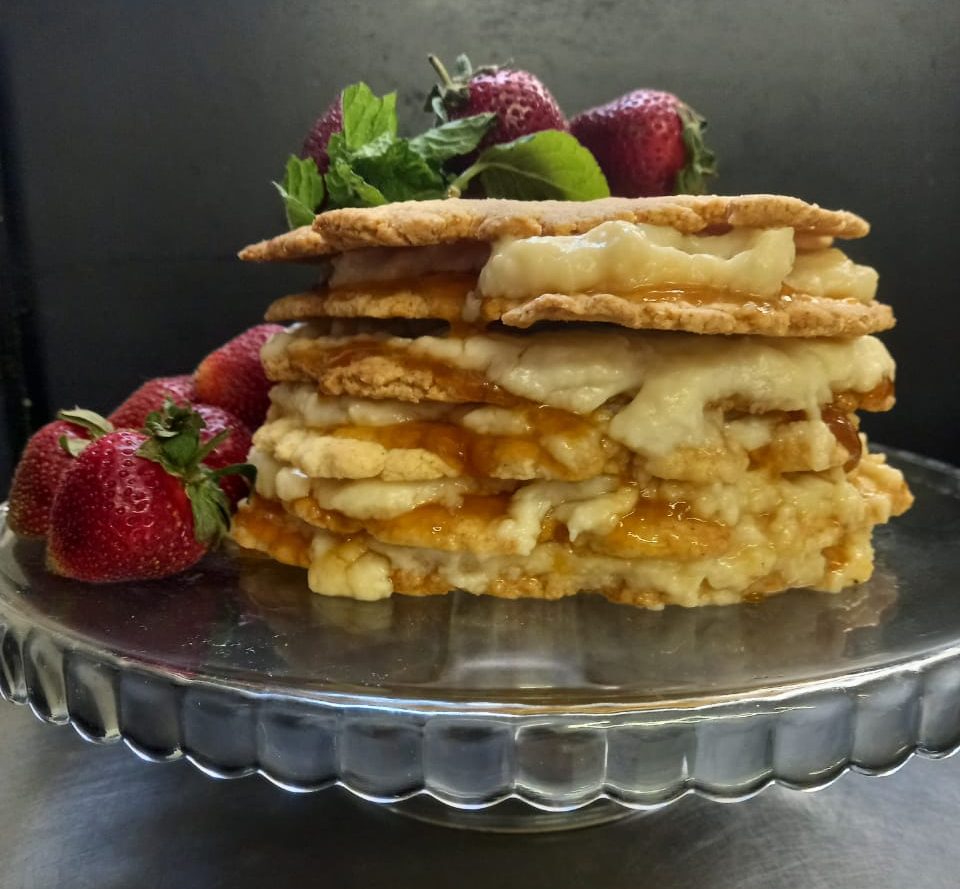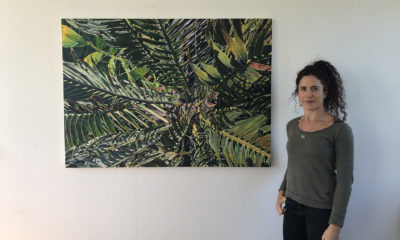
Lifestyle

Layers of history and mystery in delicious ‘Jodetert’
It’s a showstopper of a cake – pancake-thin baked biscuits layered with homemade custard, piled high in a way that’s pleasing on the eye and the appetite. It’s called a “Jewish custard tart”, but it’s most commonly known as a “Joodsetert”, “Jodetert”, or “Jodetort” in the Afrikaans community, where it’s a favourite at bake sales and celebrations. So why don’t South African Jews know about the cake that’s named after us?
Jewish caterers across the country say the recipe has never crossed their tables. “This is the first I’ve heard of it. In the 40-odd years of being in this industry, it’s never been requested, offered, or discussed,” said restaurant owner Michael Wener in Cape Town.
Chefs Sharon Glass in Johannesburg and Linda Nathan in Durban echoed the sentiments. Jodi Chait in Cape Town responded positively, saying “I make this all the time!”, but she didn’t inherit the recipe from her mother or bobba. Rather, she was told about it by her dentist, who is Afrikaans. She still follows his recipe today.
Responding to a post on Facebook, Lynette Cronje and Charlotte Smith told the SA Jewish Report that growing up in Pretoria and East London, Jodetert was a favourite in their homes.
“My Afrikaans grandma always used to bake this. It was her star recipe, and she passed it on to me,” says Smith. “Her recipe was handwritten. I think she probably got it from her local women’s organisation or a friend or family member. Her Jodetert was the favourite at the tuisnywerheid [home industry store].”
Cronje’s story is almost identical to Smith’s, and when both women asked Jewish friends if they had heard of Jodetert, they hadn’t. Cronje landed up bringing one all the way from Pretoria for her Jewish friend to try.
When Small Jewish Communities Association National Director Rabbi Moshe Silberhaft asked Jews living in country communities if they had made or heard of Jodetert, all but one said they hadn’t. “The one coffee shop in Bethlehem makes Joodsetert, and others in Bethlehem make it too. We always said we’ve never heard of it or made it. We find it very strange,” says Lauren Klevansky.
Megan Furniss wrote a blog post in 2016 describing how she had known her husband “for almost 13 years, and over those 13 years, he has told me about his most favourite dessert, a thing called Jewish Tart.” He came from an Afrikaans background, and “his ouma and mom made it for him on very special occasions, and it was his best thing. I have never heard of or seen a Jewish Tart, so I thought maybe his strange and wonderful family had given something this name, and they were the only ones.”
Furniss subsequently made the cake, but it was “a disaster”. She suggests that the recipe may have been named for Jews whom Afrikaans-speakers interacted with.
In response to Furniss’ post, Ronni Israelstam wrote in 2018 that he went to an excellent Afrikaans-owned bakery in Joburg, and they had miniature Jodeterte for sale. “It got me searching for the origins amongst my ‘boereJode’ and Afrikaans friends. They had all heard of it, and many had recipes from grannies, but no one could explain the origin. As a Jewish person, I’ve never come across this confectionery, so I’m really puzzled.”
Some in the South African Jewish community say they know of a similar cake, called a Napoleon or a Tort Medovik, and that their mothers or grandmothers baked such a cake. Writing from Lithuania, Nida Degutiene told the SA Jewish Report, “After reading the recipe, I’m confident that this is a Napoleon – the iconic cake baked in Lithuania for more than 100 years. The only addition to the recipe is one layer of cranberry jam. Without Napoleon Cake, any celebration, wedding, or family gathering wouldn’t be possible,” she says.
Degutiene is “more than certain” the Napoleon Cake was made by Jewish women in Lithuania and taken with them to South Africa. She spoke to Professor Rimvydas Lauzikas, the leading expert on culinary history in Lithuania, who said that the Napoleon Cake was created in Russia in 1912 by a French chef to celebrate the 100-year anniversary of the so-called Patriotic War or French invasion of Russia.
Lauzikas says the recipe could have travelled along with Jewish families from Lithuania to South Africa, in particular from larger cities, as wealthier members of society often had French chefs who may have made the Napoleon Cake.
However, “The problem is that neither Tort Medovik nor Jodetert nor anything similar appear in South African Jewish community cookbooks,” says Gavin Beinart-Smollan, a food historian and archival researcher for the course “A Seat at the Table: A Journey into Jewish Food” at the YIVO Institute for Jewish Research.
“I haven’t come across anything resembling these recipes in my own research on these cookbooks,” he says. “And the cookbooks certainly do include Litvak baked goods and sweets that Jewish immigrants brought with them – teiglach, pletzlach, imberlach, and so on. So even if Jodetert did originally come from Jewish immigrants to South Africa, it was likely never something that was particularly widespread amongst Jews.” Asked if Jodetert could have been an Afrikaans recipe named for Jews, Beinart-Smollan says this is plausible.
And yet, the Jewish connection remains there – a link as thin as the biscuit bases it features. In her meticulously researched story, “Putting the Jew back into Jodetert” in Daily Maverick on 23 October 2020, food writer Dr Anna Trapido found a recipe closely resembling Jodetert but listed as a Napoleon Tort in the Kitchen Stories community cookbook published in 2018 as a fundraiser for the Ohr Kodesh Congregation, Beit Shemesh-Mateh Yehuda, Israel.
The recipe was supplied by Leningrad-born émigré Stella Shurhavetsky. “Her layers are made using the same ingredients and virtually the same quantities that South Africans use in a Jodetert,” writes Trapido. “Mrs Shurhavetsky also offered a theological explanation for the seven layers in her recipe. Seven represents the seven species, the seven days of creation, the seven laws of Noah, and the seven times Israelites encircled the walls of Jericho. In South Africa, the meaning has been lost but the number remains”. As one Free State baker observed, “I don’t know why, but I just do it that way. It’s seven because it has always been seven – that’s what my ouma did.”
For now, the recipe remains a treasured heirloom in Afrikaans households – and a way for Jewish and Afrikaans communities to connect.
“I grew up eating Jodetert at all the special functions on my mother’s side of the family. My grandmother used to make it especially for my uncle, it was his absolute favourite. This photo is taken from my mother’s ancient cookbook,” wrote Maché Myburgh on her food blog in 2014, sharing an image of a typewritten recipe in Afrikaans.
“No one knows where it comes from. It’s called a Jewish Custard Tart, but nowhere else in Jewish cooking do we see anything like it. It’s not typically boerekos [Afrikaans food] either, since it’s a bit more intricate in construction.”
When contacted by the SA Jewish Report six years after writing this, Myburgh becomes emotional. “We follow my gran’s Jodetert recipe, and we just found out this afternoon that she isn’t well – she may not make it to her 90th birthday in January. It would be such an honour to share her recipe with you.”











Reeva Forman
March 28, 2021 at 12:52 pm
Never heard of it!
Sounds delicious. Love to try. NOT make.. Chag Sameach